What Does a Hospital Chaplain Do Day-to-Day?


Hospital chaplains are an essential component of holistic healthcare, providing spiritual and emotional support to patients, families, and staff. Their work ensures that amid medical treatment, emotional well-being and spiritual needs are also addressed, fostering healing and comfort during some of life's most challenging moments.
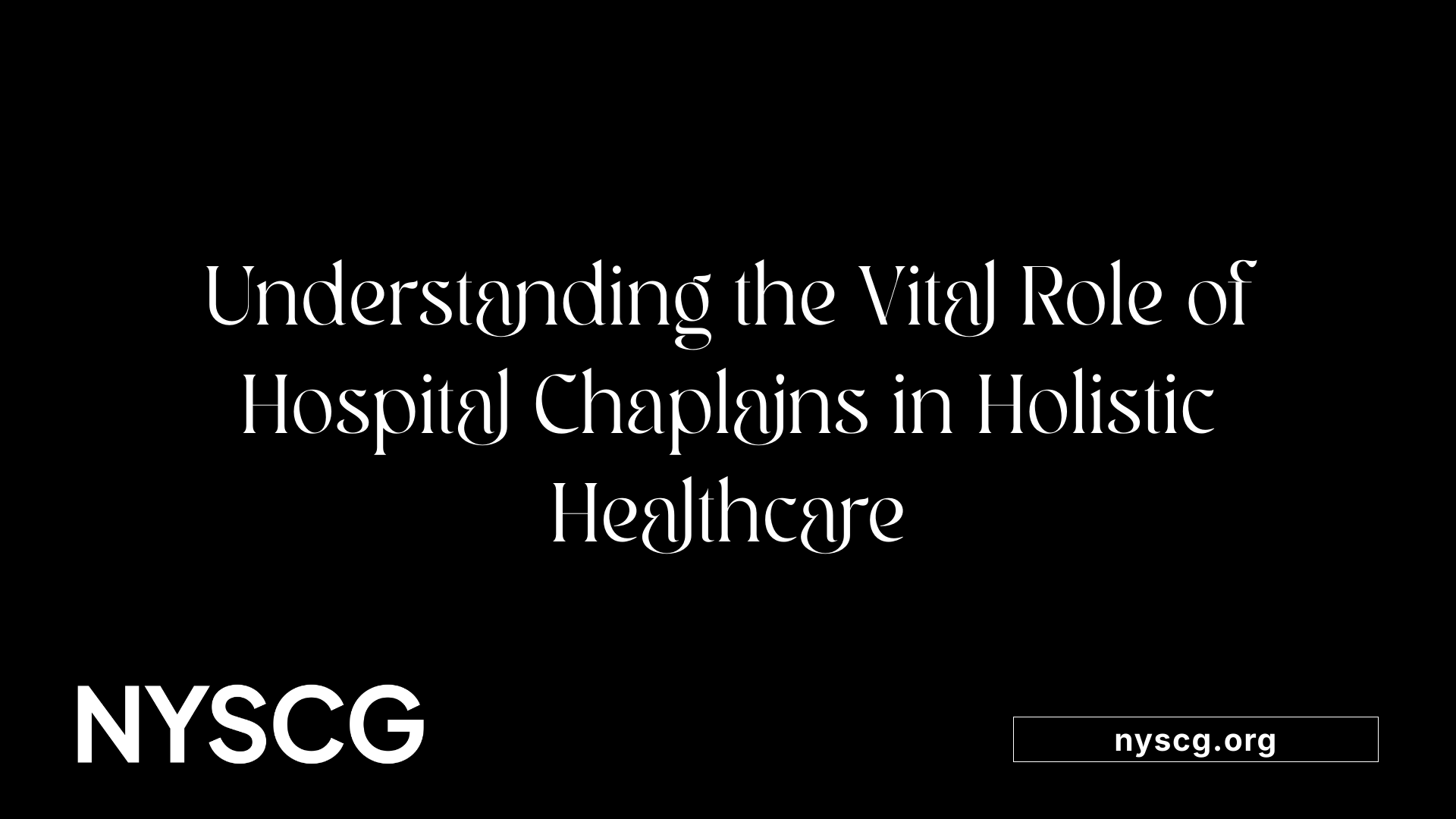 Hospital chaplains play a vital role in providing holistic care within healthcare settings by addressing the spiritual and emotional needs of patients, families, and staff. Their typical duties encompass a wide array of responsibilities aimed at offering comfort, religious support, and guidance during challenging times.
Hospital chaplains play a vital role in providing holistic care within healthcare settings by addressing the spiritual and emotional needs of patients, families, and staff. Their typical duties encompass a wide array of responsibilities aimed at offering comfort, religious support, and guidance during challenging times.
One of their main tasks is to provide spiritual guidance and emotional support. This includes listening, praying with patients, offering counsel, and being present during moments of crisis, such as diagnoses or end-of-life situations. Chaplains also perform religious rituals and ceremonies—like bedside prayers, baptisms, Holy Communion, or last rites—to fulfill the spiritual needs of individuals from diverse faith backgrounds.
In addition to ritual practices, they serve as crisis responders by offering grief counseling and bereavement support. Whether a patient faces a difficult prognosis or a family grieves a loss, chaplains help process grief, offer comfort, and facilitate mourning rituals.
A key aspect of their role involves acting as mediators and advocates between patients and healthcare providers. Chaplains communicate medical procedures and ethical considerations, ensuring that the patient's spiritual and emotional concerns are understood and respected by the medical team.
Supporting end-of-life care is a significant responsibility. Chaplains assist with planning and conducting meaningful spiritual rituals, facilitating discussions about advanced directives, and providing solace during the dying process. They also help families navigate grief and support staff members dealing with the emotional toll of their work.
Collaboration with healthcare teams is crucial. Chaplains participate in team meetings, contribute insights into patients’ spiritual and emotional well-being, and recommend approaches to integrate spiritual care into overall treatment plans. This teamwork ensures that holistic care addresses not just physical health but also spiritual resilience.
In the daily routine, hospital chaplains visit patients in various departments—such as ICU, emergency, and medical-surgical units—and support them through prayer, sacraments, or simply listening. They also work with hospital staff to develop educational programs and provide training on spiritual issues.
Overall, hospital chaplains help create a compassionate environment by alleviating stress, supporting ethical medical decisions, and fostering hope and meaning in difficult circumstances. Their work underscores the importance of spiritual care as an integral part of comprehensive healthcare.
| Aspect of Role | Activities | Details |
|---|---|---|
| Providing spiritual support | Prayers, sacraments, rituals | Supporting diverse faith traditions and personal spiritual needs |
| Offering emotional aid | Crisis counseling, grief support | During diagnoses, death, or traumatic events |
| Performing religious ceremonies | Baptisms, blessings, end-of-life rites | Ensuring spiritual practices are observed in hospital settings |
| Acting as advocate | Explanation of procedures, ethical guidance | Facilitating understanding and respecting patient wishes |
| Collaborating with healthcare teams | Meetings, reports, care planning | Integrating spiritual considerations into overall treatment |
| Supporting staff | Stress management, burnout prevention | Offering resources and emotional support to caregivers |
Search Query to find more information: "Hospital chaplain duties and responsibilities in healthcare settings"
Hospital chaplains have a varied and compassionate role, making their daily routine rich with activities focused on emotional and spiritual support. A common starting point is visiting patients across different hospital units such as Intensive Care Units (ICU), emergency departments, and surgical wards. These visits are often spontaneous and require sensitivity to the patient's condition and emotional state.
During visits, chaplains provide presence—listening, praying, or offering comforting rituals tailored to individual needs. They might conduct or facilitate religious ceremonies like baptisms, blessings, or communion, depending on the patient's faith background. Supporting families during critical times such as diagnoses or end-of-life decisions is also a key part of their work.
In addition to patient-focused activities, chaplains work closely with healthcare teams by participating in staff meetings or ethics consultations. They advocate for patients’ spiritual needs and contribute insights about emotional well-being, helping craft holistic care plans.
Crisis intervention is another frequent task, whereby chaplains offer immediate emotional support during emergencies or traumatic events, assisting staff and patients coping with stress.
They also support hospital staff by addressing burnout and managing stress through debriefings or providing resources for resilience. Administrative duties such as updating patient reports, documenting interactions, and communicating with religious communities or clergy are woven into their day.
Throughout their shift, chaplains continually engage in reflective listening and compassionate care, respecting diverse faith traditions and personal beliefs. This combination of structured activities and spontaneous moments allows hospital chaplains to fulfill their mission of holistic care, addressing not just physical needs but also the emotional and spiritual aspects of health and suffering.
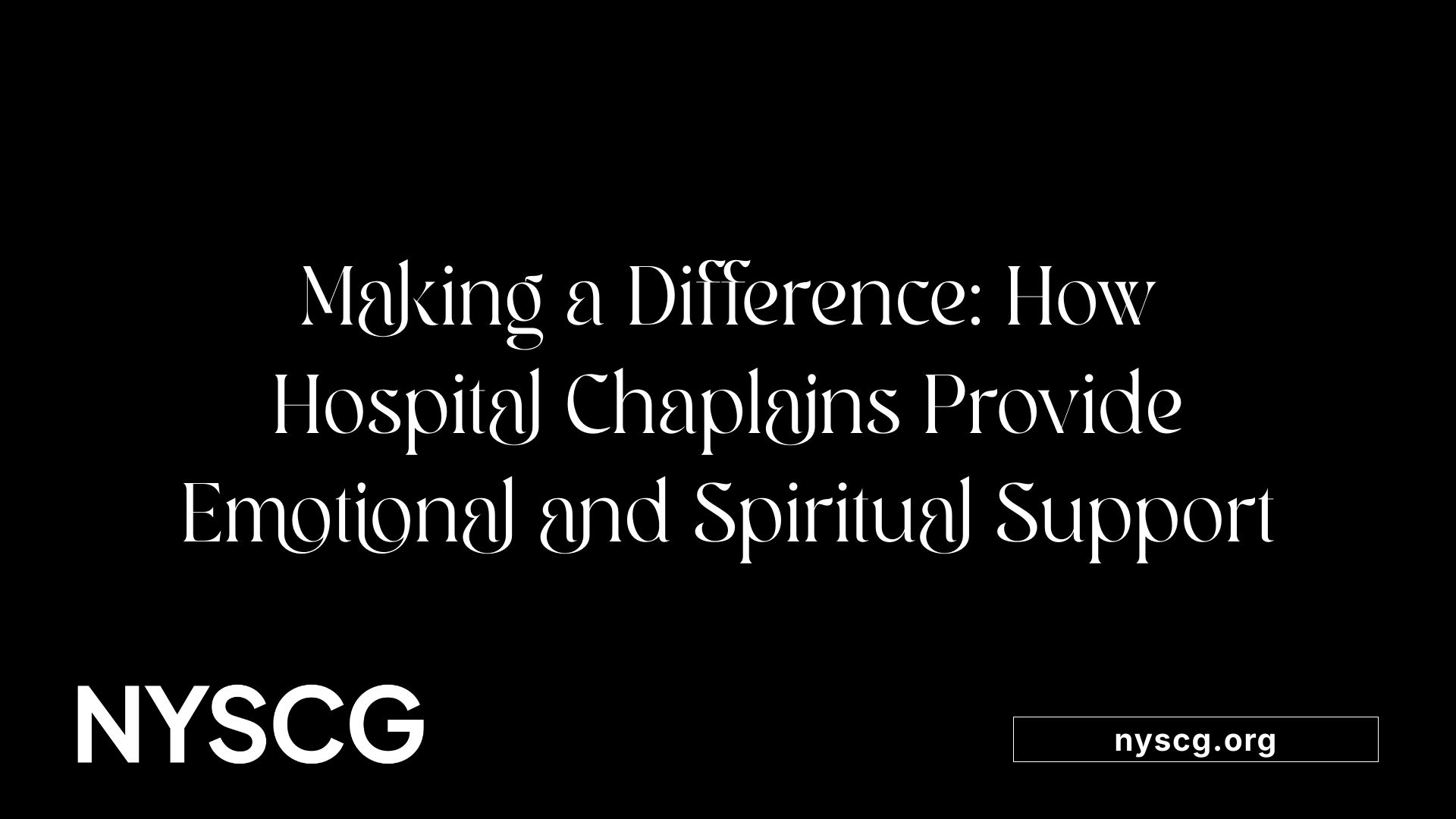
Hospital chaplains play a vital role in providing emotional comfort and spiritual guidance within the hospital setting. They are present during difficult times, offering a compassionate ear and a calming presence to patients, families, and hospital staff alike.
For patients and their loved ones, chaplains facilitate religious rituals such as prayers, baptisms, sacraments, and end-of-life ceremonies. These rituals help meet spiritual needs, offer hope, and foster a sense of peace amid illness or grief. They also provide emotional support by listening attentively, counseling, and helping individuals find meaning in their experiences.
Chaplains connect patients with their faith communities or clergy, assisting with religious resources and supporting spiritual practices even within the hospital environment. Whether it's offering sacred writings, holy water, or participating in religious rites, they tailor their services to meet diverse spiritual and religious backgrounds.
In addition to supporting patients and families, chaplains actively care for healthcare staff. They address emotional and spiritual stress caused by the demands of patient care, especially during crises such as medical emergencies or COVID-19 pandemic challenges. Chaplains participate in team meetings, debriefings, or provide blessings and moral support to help staff cope with burnout and trauma.
Their presence during organizational crises, ethical decisions, or life-and-death situations helps create a supportive environment for all involved. By offering spiritual reassurance, guidance, and rituals, hospital chaplains ensure that emotional and spiritual needs are integrated into holistic healthcare.
Overall, chaplains are indispensable members of the healthcare team, committed to nurturing hope, resilience, and faith across a wide range of beliefs and circumstances.
| Support Area | Key Activities | Additional Details |
|---|---|---|
| Emotional Comfort | Listening, counseling, grief support | Providing a caring presence during emotional distress |
| Spiritual Guidance | Religious rituals, sacraments, prayer | Facilitating faith practices in medical settings |
| Connection to Faith | Linking patients with clergy, faith communities | Supporting religious needs and community integration |
| Staff Support | Crisis debriefings, blessings, emotional resilience workshops | Assisting healthcare workers with stress management |
| Crisis Management | Emergency support, ethical consultation, spiritual interventions | Providing hope and clarity during critical moments |
Chaplains embody compassion, spiritual awareness, and interfaith sensitivity, making a profound difference in the hospital environment.
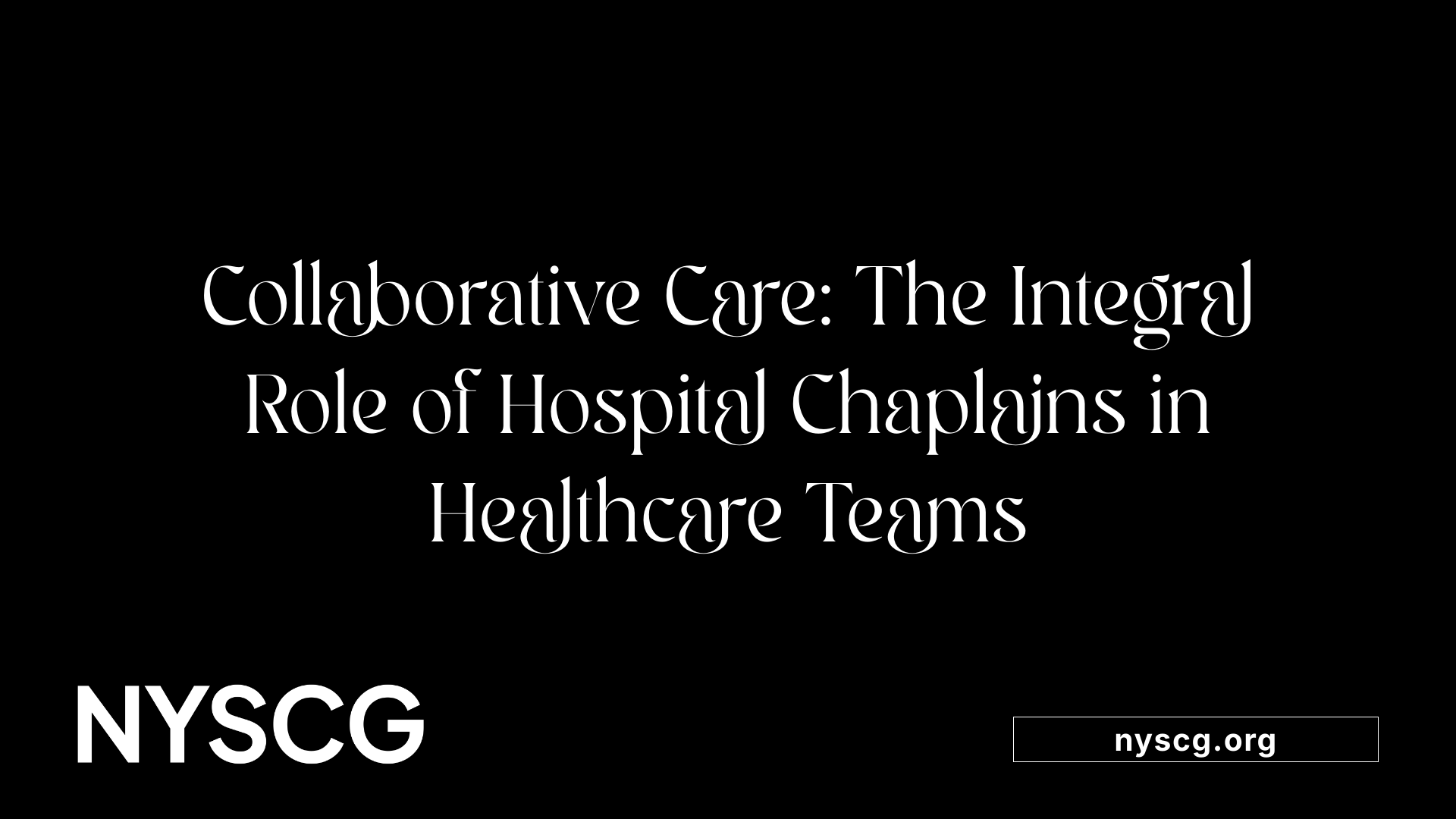
Hospital chaplains are integral members of the healthcare team, actively engaging in daily rounds and care planning sessions. They meet regularly with doctors, nurses, and other medical professionals to discuss patient needs, especially focusing on emotional and spiritual concerns that may influence treatment outcomes. In these meetings, chaplains provide insights into patients’ emotional states, cultural backgrounds, and spiritual preferences, which can inform personalized care approaches.
Through participation in interdisciplinary rounds, chaplains help ensure that patients’ holistic needs are considered alongside medical treatments. They offer compassionate input on patients’ coping strategies, religious rituals, and end-of-life preferences, facilitating communication between patients, families, and healthcare providers. This collaborative approach promotes comprehensive care, addressing not only physical health but also emotional resilience and spiritual peace.
Supporting patient-centered care involves addressing the emotional and spiritual dimensions of health that often go beyond routine medical treatment. Hospital chaplains act as advocates for patients’ spiritual needs, helping them find meaning and comfort during illness, injury, or loss.
They assist in difficult decisions such as accepting or declining treatment options, and help patients and families navigate complex emotions and ethical dilemmas. Chaplains also coordinate with hospital staff to implement activities like religious rituals, prayer sessions, or sacramental ceremonies, respecting individual faith traditions.
During crises, such as serious diagnoses or end-of-life situations, chaplains provide crisis intervention and emotional support, fostering hope and resilience. They also support hospital staff, providing resilience training, or simply offering a listening ear to prevent burnout. This integrated, holistic approach underscores the importance of spiritual well-being as a vital component of healing and recovery.
| Aspect | Role | Details |
|---|---|---|
| Collaboration | Participates in rounds | Communicates with medical teams to discuss patient needs |
| Ethical support | Provides insights | Contributes to ethical discussions and decision-making |
| Rituals and sacraments | Supports religious practices | Arranges services like baptisms, blesses patients |
| Crisis intervention | Offers emotional support | Helps patients and families cope with trauma and grief |
| Staff support | Aids resilience | Provides resources and emotional backing for health care workers |
By working hand-in-hand with medical staff, hospital chaplains help foster a caring environment that addresses all facets of patient health. Their contribution emphasizes the importance of emotional and spiritual support as part of comprehensive healthcare, ultimately improving patient satisfaction and overall well-being.
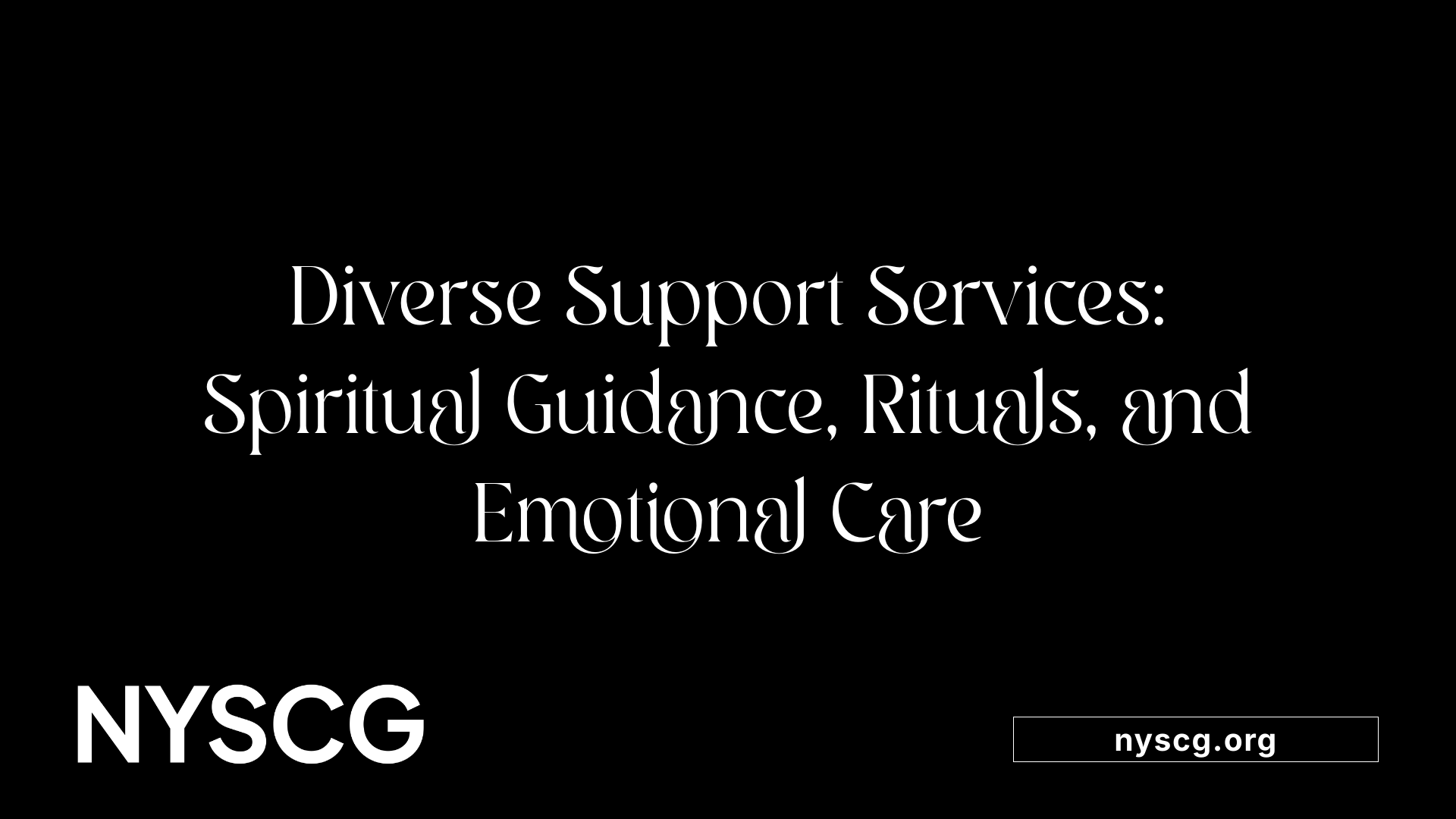 Hospital chaplains provide a diverse array of support services that cater to the spiritual, emotional, and ritual needs of patients, families, and hospital staff. Their primary role is to offer comfort and guidance, which can take many forms depending on individual circumstances and beliefs.
Hospital chaplains provide a diverse array of support services that cater to the spiritual, emotional, and ritual needs of patients, families, and hospital staff. Their primary role is to offer comfort and guidance, which can take many forms depending on individual circumstances and beliefs.
One of their main functions is spiritual counseling, where they listen empathetically, help individuals find hope, and process their feelings during illness, grief, or personal crises. They also provide religious guidance, helping patients and families understand and navigate religious beliefs and practices relevant to their situation.
Chaplains facilitate religious rituals essential for many faith traditions. These include prayer, meditation, reading from sacred texts, blessings, and holy sacraments such as baptism or Holy Communion. They organize memorial services and religious observances during religious holidays, ensuring that patients’ spiritual needs are respected regardless of faith or lack of it.
In addition to individual support, hospital chaplains lead group prayers, support spiritual reflection, and conduct religious ceremonies in hospital chapels or patient rooms. They also assist with end-of-life care planning by conducting last rites or giving ethical guidance on complex medical decisions. Many chaplains help coordinate with community clergy or faith leaders when additional religious resources are needed.
Beyond supporting patients and families, chaplains play a crucial role in promoting emotional well-being among healthcare staff. They lead staff prayer groups, offer crisis intervention, and provide stress management and resilience-building sessions. During emergencies, chaplains are on-call for immediate emotional and spiritual support.
Their services are available round-the-clock, emphasizing their commitment to providing timely support in urgent or distressing moments. This 24/7 availability is especially vital during critical incidents, life-threatening situations, or death.
Overall, hospital chaplains serve as compassionate mediators and advocates, helping individuals find comfort, understanding, and spiritual peace amid the challenges of healthcare. Their work, rooted in faith and empathy, underscores the importance of holistic care that addresses the spiritual dimension of healing and suffering.
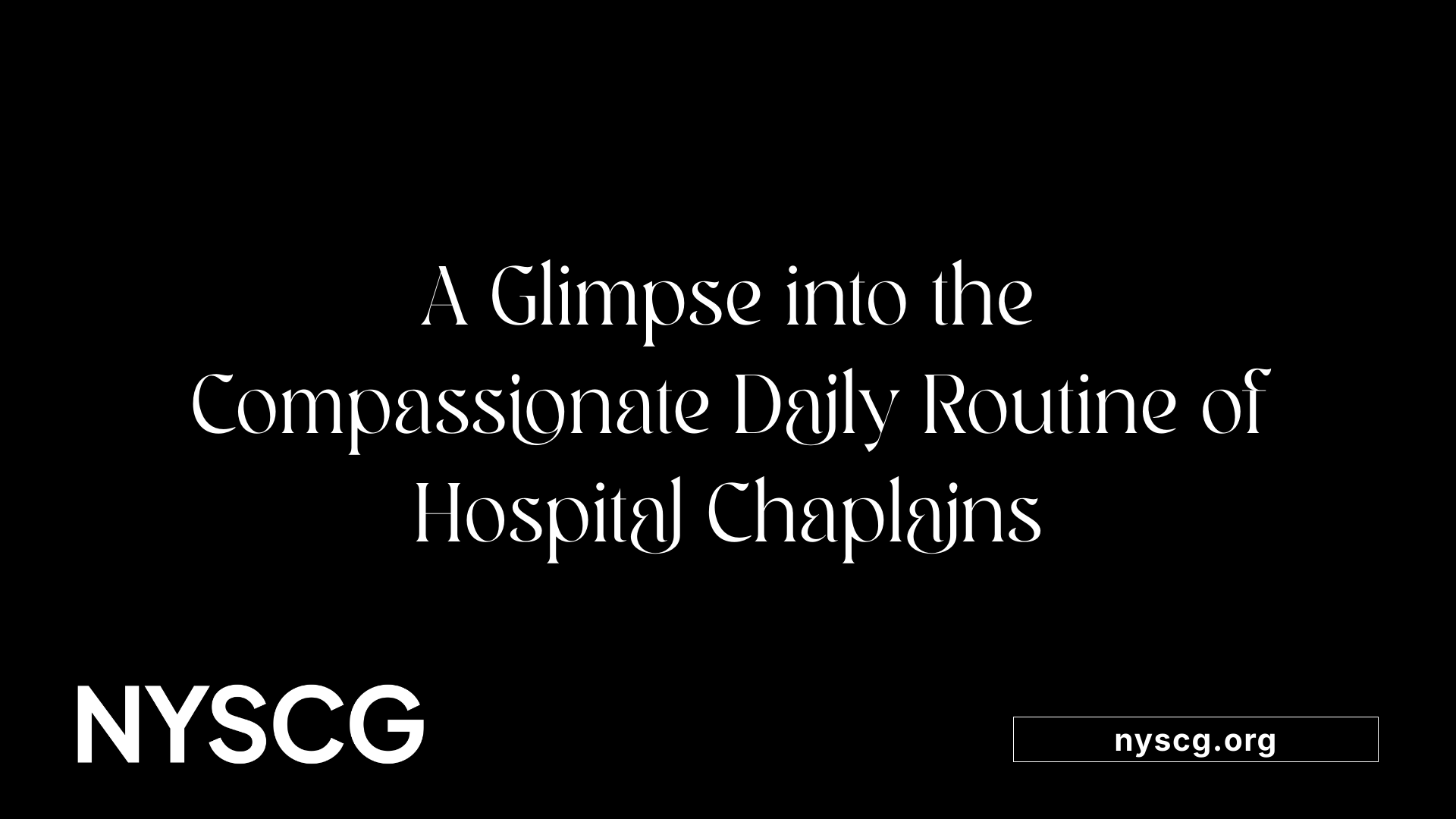
Hospitals often begin their mornings with chaplains arriving early to prepare for the busy day ahead. They may gather in a quiet space, such as the hospital chapel, to pray, reflect, and review their schedule. Some chaplains participate in brief team meetings, where they share updates on patient needs, upcoming events, and any emergency requests.
During these meetings, chaplains discuss specific patient cases, coordinate with other healthcare providers, and plan interfaith or hospital-wide spiritual activities. This preparatory step helps chaplains stay connected with their colleagues and ensures they are ready to provide support where it is needed most.
Throughout the day, chaplains visit patients in various hospital units, including ICU, surgical wards, and emergency departments. Their presence offers comfort during difficult times, such as after dealing with a critical diagnosis, trauma, or preparing for surgery.
Chaplains listen attentively, pray with patients, and perform religious rituals like blessings, sacraments, or baptisms according to individual preferences. They also tend to family members, helping them process news, cope with grief, or prepare for significant events like childbirth or discharges.
They often provide emotional support, meditative practices, or spiritual counsel, regardless of the patient's faith background. Their role emphasizes presence and listening, tailoring support to each person's unique spiritual needs.
In addition to patient visits, hospital chaplains participate in various hospital activities. These include attending interdisciplinary team meetings, where they share insights on patients' emotional and spiritual well-being.
Chaplains may lead or organize religious services, prayer groups, or memorial events—such as honoring deceased patients or celebrating new births. They also collaborate with hospital administrators and staff to develop programs that support staff resilience and mental health.
Engaging in these activities helps integrate spiritual care into overall patient treatment and fosters a holistic approach to healthcare.
Chaplains are on-call 24/7 to respond to emergencies. They are paged or called upon when urgent, life-critical situations arise, such as a patient coding or facing imminent death.
In emergencies, chaplains swiftly arrive to provide solace, perform last rites, or offer prayers to patients and families. They may also support medical staff during or after traumatic events, helping manage stress and emotional strain.
Their presence can be crucial for calming anxiety, offering ethical guidance, or simply being a compassionate human presence during crises.
What does a typical day look like for a hospital chaplain?
A usual day involves starting with spiritual preparation, visiting and supporting patients and their families, taking part in hospital meetings, and responding promptly to emergency situations. This varied schedule underscores the importance of adaptability, compassion, and teamwork in their vital role within hospital care.
Hospital chaplains serve a vital function in contemporary healthcare by addressing the spiritual, emotional, and existential needs of patients, families, and staff. Their daily routines encompass a broad range of activities, from bedside visits and religious rituals to interprofessional collaboration and crisis support. As advocates and mediators, they foster trust, provide comfort, and help individuals find hope and meaning amid difficult circumstances. Their presence not only complements medical treatment but also enriches the healing environment, emphasizing the importance of holistic care that honors the human spirit. In times of crisis, transition, or celebration, hospital chaplains stand as compassionate guides, ensuring that no one faces the challenges of illness or loss alone.
All you need is the will to make the world a better place.
New York State chaplain group inc. is a tax deductible organization with a federal tax Id number 92-383-4921